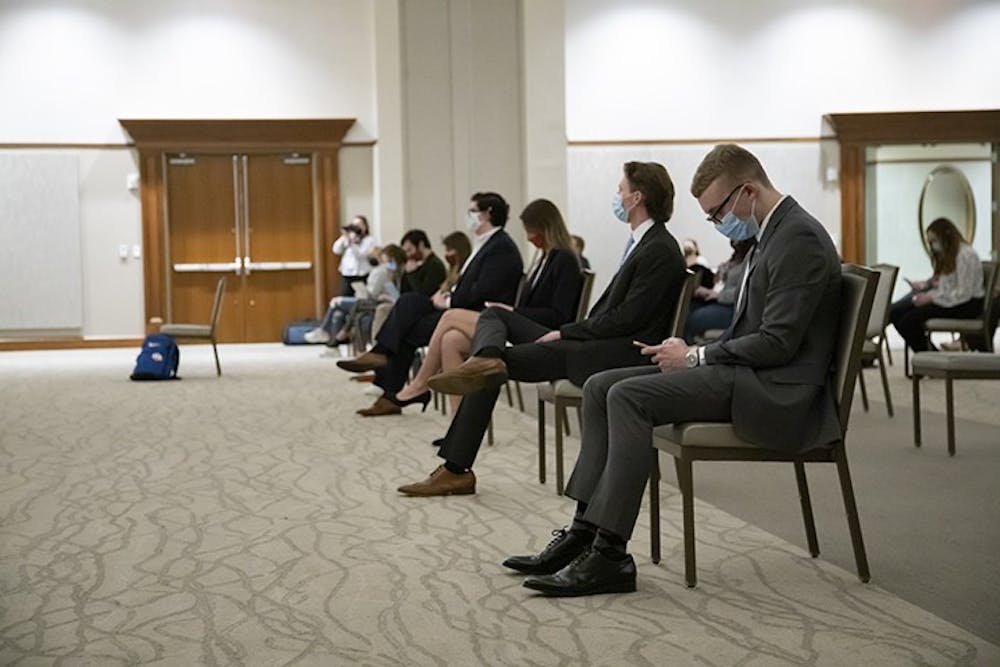There was a Student Government debate on Tuesday for the upcoming election, and I wish I could say it mattered. It mostly felt like an exercise for whoever's running; an exercise for some elected office or important interview after college that won't affect any of us if we don't live in that county or work for that company.
Perhaps this year, more than most, there were some steps to accomplish goals defined by various candidates and campaigns. However, this is just junior Congress, where vague positive promises are said to appease a disgruntled public.
There was a little extra zest this year with the added drama of the entire treasurer position potentially being dissolved in favor of a finance committee. However, other than vaguely mentioning during the debate that the referendum could make Student Government more "sustainable" for student activities, the candidates were unclear about its impact on the actual student body.
It was easy for all of the presidential candidates to condemn the actions of professor David Voros and the culture that made his victims fearful to come forward. But, what policy or attitude changes come when we "listen" to the voices of sexual assault survivors, according to what presidential candidates Aidan Baker, Alex Harrell, Caden Askew or Cameron Butler mentioned? Acknowledging the privilege of manhood is nice and all, but it has a performative feeling in this setting (especially when men can be harassed and assaulted, too).
One of the hottest topics of the night was diversity, which most candidates gently evaded or wantonly fumbled through. Answers to questions regarding this topic can fit into two categories: disappointing but not surprising or utterly baffling.
How can we even politely ask for diversity and inclusion from those themselves who are not diverse? There is one Black candidate running for an executive position this year. No women are running for president (but, hey, the only vice presidential candidates are women). It was refreshing, at least, to hear multiple candidates say they want to involve more diverse student organizations and that some want to encourage people that better represent the entire student body to run for the student senate.
This also got somehow twisted into a discussion about lack of representation between colleges in the student senate, as seen in a debate between senators Morgianna McDevitt and Christian Phillips. Maybe it does suck that the majority of senators are from the College of Arts and Sciences, so those in other majors don’t have their interests discussed as much. However — and this is personal bias, of course — when discussing “diversity and inclusion,” one can almost certainly conclude that the discussion is about the inclusion of underserved minorities, such as people of color, the LGBTQIA+ community, disabled people or religious minorities. Yet, as always, discussions about race remain nebulous.
Having an open discussion about inclusivity is great, but what exactly does that entail? The "Evolve" campaign, including Baker and vice president candidate Emily Dengler, includes repealing the Heritage Act, a piece of state legislation. Repealing the Heritage Act is something people want: Petitions to repeal it have gained over 300,000 signatures. But how can the student government of any college anywhere repeal government legislation?
A student vote on the university's board of trustees would be great. How is that going to happen, exactly, gang? Expanding mental health resources and campus safety are dearly needed and wanted. How are a bunch of 20-somethings in suits going to do that, when it's ultimately left up to the university?
Still, please look at who you vote for. At least read the little blurb underneath their names on the school website so you can determine for yourself if they’re full of crap or not. Ask around to see if people in their dorm, classes or school organizations despise them or if they’re actually a decent, stand-up person.
I'm saying all of this doesn't matter too much, but it's better to have a politically motivated but decent candidate in office than someone just relishing in putting this on their resume. Even if the debate did not say a whole lot about anybody's actionable goals that will directly affect students, still vote. The debate, itself, however, will likely not influence too many Gamecocks out there.

